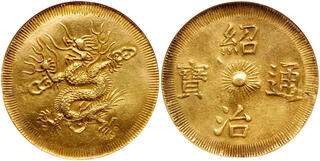Lot description:
Annam (ancient name for Vietnam), gold Piastre (also known as a 7-tien), undated but struck circa 1841-47. Sch-283;Fr-3; KM-343 (283). 27.36 grams. Thieu Tri, 1841-1847. Chinese inscription naming the emperor, Thieu Tri Thong Bao (thus providing the time of issue), around central radiant sun. Reverse side displays a fierce dragon striding to the left; a classic banker's mark (placed to verify that the bank accepted the coin as valid) by the dragon's rear foot (on right). Each side is rimmed by long denticles meant to protect the design. Rare and seldom seen with luster. PCGS graded About Uncirculated Detail (Repaired). Estimated Value $10,000 - UP
The modern country of Vietnam has a very long history of conflict beginning in 207 B.C. when an invading Chinese general established the Kingdom of Nam-Viet stretching along the coast of the South China Sea. A hundred years later, it became a province of China during the Han Dynasty. Centuries of strife followed, during which clusters of populations became the cities of Saigon, Hue and Da Nang. When the French military conquered the land early in the 19th century, they divided it into three areas of control-the northern area was named the Protectorate of Tonkin, the southern portion was called Cochin (a Chinese colony also known as French Cochin China), and the large central area of plateaus and hills, and the fertile coastal plain (the most populous) was called the Protectorate of Annam. The name was a French transliteration of Chinese characters meaning "peaceful south." The Vietnamese hill people never accepted the Chinese name, even during the period of extreme French "protection" in the early 1880s. The world referred to the collective land as French Indo China. The capital city of Annam was located where the Chinese imperial court of Hue had been held. Chinese emperors seated at Hue had the temporary authority to produce their own coinage which grew in numbers and diversity during the 19th century. One of the largest and most elaborately engraved was this coin. It is a miracle of survival, considering the conflicts that took place during French occupation and the wars that followed.
Ex Goldberg 'Millennia' Sale, 46, May 26, 2008, lot 877, previously in NGC holder graded AU-55, price realize $22,000. |  |